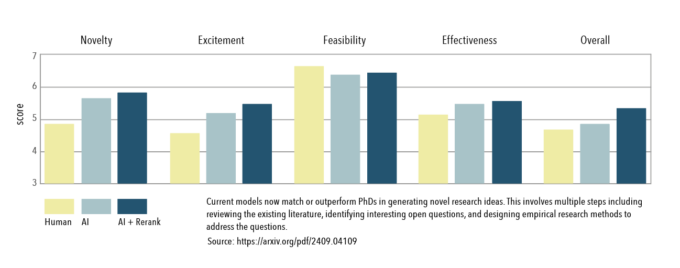While impressive and transformative, these early phase incarnations of AI are assistants for specific tasks and are inherently siloed. They exhibit deep but narrow expertise, excelling in isolation but requiring human mediation for deployment, applying findings, bridging disciplines, and interpreting results within a broader business context.
Professional roles demand more than isolated expertise. Consider a management consultant leading a project. This requires seamless coordination across multiple domains, such as strategic analysis, project planning, client engagement, and team leadership. Until now, AI could support these functions piecemeal but could not integrate them in a coordinated, end-to-end manner. The need for human oversight in weaving these threads into a cohesive strategic vision kept AI in a subsidiary role.
Today’s AI-forward manager leverages AI whenever she can. She might employ AI to help her conduct an industry and SWOT analysis. She might have an AI assistant draft a strongly worded email to her boss asking for additional resources for a project. She might even use recent AI models to run statistical analyses and generate charts for a presentation. But while our consultant embraces AI to help with specific tasks, she still controls, manages, and oversees the span of activities, pulling in AI expertise as appropriate for narrow tasks.
All of this explains why the dominant rhetoric today is that AI will be a companion, copilot, or assistant for knowledge workers rather than a replacement. However, recent advances suggest a different and very disruptive future.
Phase 2: AI as task manager
(2024-onward)
The newest models handle more than just specific tasks. Like OpenAI’s o1, they demonstrate unprecedented capabilities in complex chain-of-reasoning tasks. These systems can break down intricate problems into smaller components, solve each part systematically, and synthesize comprehensive solutions – all with minimal human intervention.
They can be given a very high-level task and autonomously carry out appropriate research and statistical analyses, draft a report including charts and graphs, and prepare the texts for personalized emails to stakeholders. This capacity for holistic task management foreshadows a future where AI could replace roles rather than just assist us. Returning to our consultant, with AI as task expert and holistic task manager, her role really begins to shrink.
Are we facing a future where AI manages all the tasks associated with knowledge work? The implications are profound: moving beyond the paradigm of AI as a tool toward AI as the primary actor, with humans increasingly serving in supportive or administrative roles. The potential scale of the disruption is significant. It can cost $100,000 a year for each human expert or manager a company hires, whereas another “instance” of an AI agent in an AI “organization” would cost close to zero.
It now becomes clear why Microsoft, Meta, OpenAI, and Google plan to spend hundreds of billions of dollars developing the next generations of AI.


 Audio available
Audio available




 Audio available
Audio available
